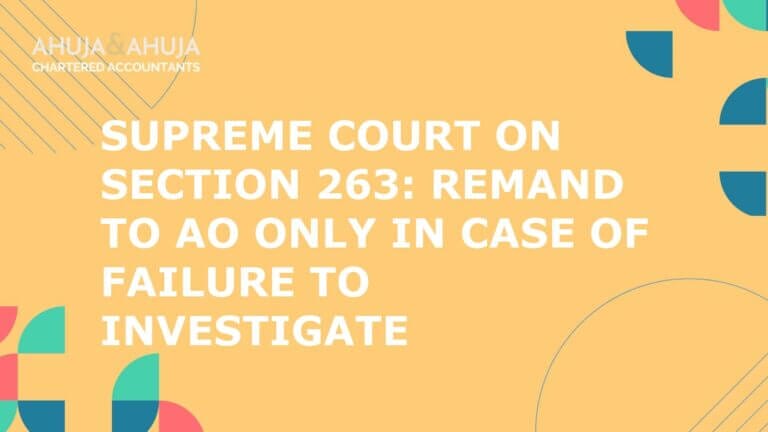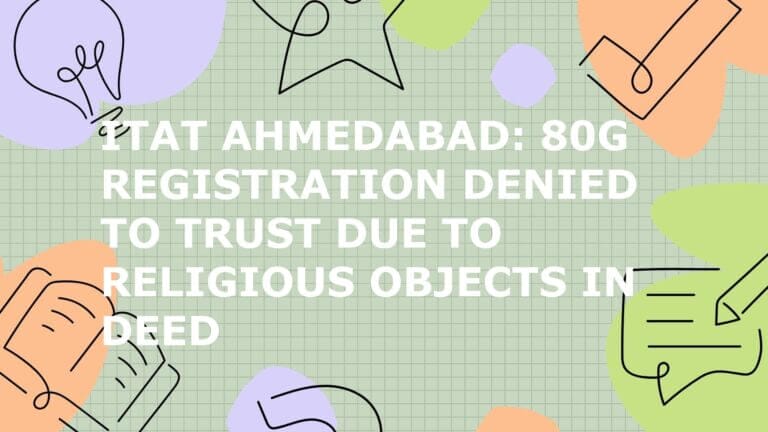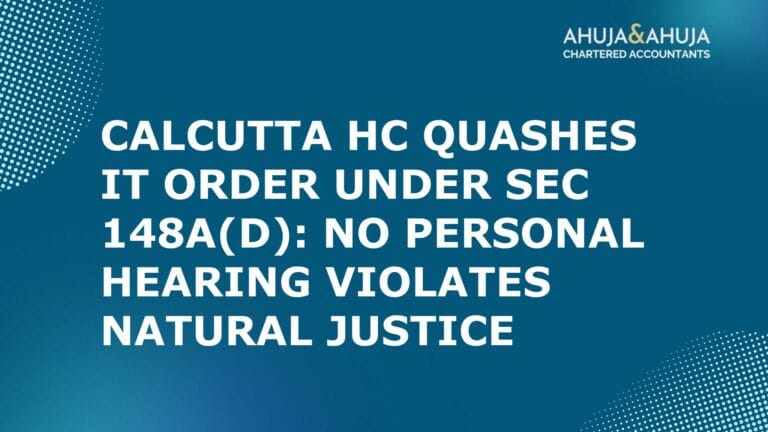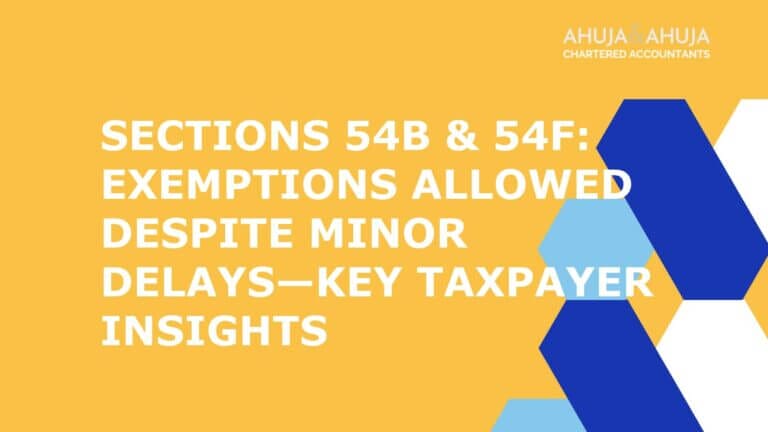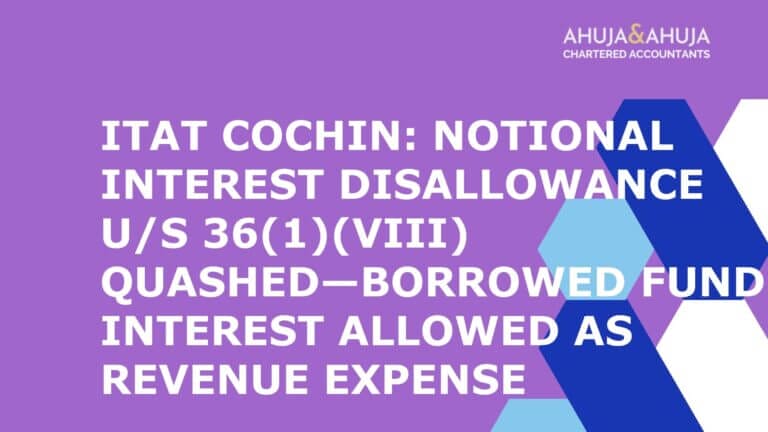Section 44AD: No Need to Explain Each Cash Deposit When Filing Presumptive Tax Returns
Small Businesses, Big Relief: Understanding Presumptive Taxation and the High Court’s Landmark Ruling
For lakhs of small business owners across India, the compliance burden of income tax can feel overwhelming. Section 44AD of the Income Tax Act was designed as a lifeline—offering a simple, hassle-free way to declare business income without the headache of maintaining detailed books or facing endless scrutiny. But what happens when the tax department questions every cash deposit in your bank account, even after you’ve opted for this presumptive scheme? The Punjab & Haryana High Court’s decision in Surinder Pal Anand v. CIT brings much-needed clarity and relief.
Let’s break down what this means for taxpayers, Chartered Accountants, and anyone navigating the world of small business taxation.
The Legal Backbone: Section 44AD and Its Promise
Who Can Use Section 44AD?
Section 44AD is a special provision for small businesses (excluding professionals, commission agents, and a few others) with annual turnover up to ?2 crore (limit was ?40 lakh for earlier years, as in the case discussed). It allows eligible businesses to declare income at a flat rate—8% of gross receipts (or 6% for digital receipts)—without the need to maintain regular books of account.
Key Features:
- No regular books required: You’re not expected to maintain detailed ledgers, cash books, or day-to-day records.
- No audit headache: If you stick to the presumptive scheme, you’re spared from mandatory tax audit under Section 44AB.
- Simple computation: Just declare 8% (or 6%) of your gross receipts as income, pay tax, and move on.
But there’s a catch: The scheme assumes that all your business receipts are properly declared. The protection applies only to business-related deposits, not to unexplained or non-business income.
For professional support with such matters, you can consult our Chartered Accountants in Chandigarh.
The Surinder Pal Anand Case: What Sparked the Dispute?
The Facts in Brief:
- The assessee, a small contractor, filed his return under Section 44AD, declaring business income as 8% of gross receipts.
- The Assessing Officer noticed cash deposits in the bank account totaling ?14.95 lakh and demanded an explanation for each entry, suspecting undisclosed income.
- The assessee explained that these were business receipts, and the total deposits were actually less than the gross receipts declared.
- The AO made an addition, treating the deposits as unexplained. The matter went up the appellate ladder.
What Did the Courts Say?
- CIT(A) and ITAT: Both appellate authorities sided with the assessee, holding that under Section 44AD, there’s no need to explain each cash deposit if the turnover is not disputed and the deposits are within the declared business receipts.
- High Court: The Punjab & Haryana High Court emphatically agreed. The judges held that once you opt for Section 44AD and your turnover is accepted, you are not required to explain every cash deposit in your bank account—unless the department can show that a particular deposit is not linked to your business.
Key Judicial Takeaway:
“The assessee was not under obligation to explain individual entry of cash deposit in the bank unless such entry had no nexus with the gross receipts.”
What Does This Mean for Taxpayers and CAs?
If Your Deposits Match Your Declared Receipts:
You’re protected. The tax department cannot demand an explanation for every cash deposit, provided the total is within your declared turnover and there’s no evidence of non-business income.If Deposits Exceed Declared Receipts:
The presumption of business nexus may not apply. The AO can question the excess and may treat it as unexplained income unless you can justify the source.Documentation Still Matters:
While you’re exempt from maintaining regular books, it’s wise to keep basic proof of business activity—like invoices, contracts, and bank statements—to defend your case if needed.
If you need assistance with income tax compliance, our income tax return filing services can help simplify the process.
Practical Playbook: Compliance, Exceptions, and Professional Guidance under Section 44AD
The Punjab & Haryana High Court’s ruling in Surinder Pal Anand v. CIT has set a clear, taxpayer-friendly precedent. But as every seasoned Chartered Accountant knows, the real world is rarely black and white. Let’s unpack the practical implications, boundaries, and best practices for both taxpayers and professionals.
Navigating Cash Deposits: When Are You Safe, and When Are You at Risk?
A. When Deposits Are Within Declared Receipts
- No Explanation Needed: If your total cash (or bank) deposits during the year are equal to or less than your declared gross receipts, and you’ve opted for Section 44AD, you’re not required to explain each deposit.
- Streamlined Compliance: This means less paperwork, fewer headaches, and a lower risk of arbitrary additions by the Assessing Officer (AO).
B. When Deposits Exceed Declared Receipts
- Red Flag for Scrutiny: If your bank deposits are higher than the turnover you’ve declared, the AO is well within rights to question the excess. The presumption of business nexus under Section 44AD does not cover unexplained or non-business credits.
- Possible Additions: Any amount that cannot be linked to business receipts may be added as unexplained income under Section 68 or other relevant provisions.
C. Practical Scenarios
- Example 1:
A small contractor declares Rs. 20 lakh as gross receipts under Section 44AD. His bank statement shows cash deposits of Rs. 14.5 lakh and some withdrawals. No issue—deposits are within declared receipts, and the presumption applies. - Example 2:
A trader declares Rs. 18 lakh turnover but has cash deposits of Rs. 25 lakh. The AO can question the excess Rs. 7 lakh, and the taxpayer must explain the source.
Documentation and Best Practices: What Should You Keep?
Even though Section 44AD spares you from maintaining regular books, some basic documentation is your safety net:
- Proof of Business Activity: Invoices, work orders, contracts, or bills—anything that shows you’re genuinely in business.
- Bank Statements: Keep all bank statements for the relevant period. They’re your first line of defence if the AO raises questions.
- Simple Reconciliation: It’s wise to reconcile your declared gross receipts with your bank deposits, at least at a summary level.
Audit Preparedness Checklist:
- Are your declared receipts in line with your bank credits?
- Do you have basic evidence of business activity?
- Can you explain any large or unusual deposits, if asked?
For expert help in preparing financial statements or tax audits related to your business, check out our audit assurance services.
Assessing Officer’s Powers: Where Does the Line Get Drawn?
When Can the AO Still Question Deposits?
- Non-Business Credits: If the AO finds evidence that a deposit is not from business activity (e.g., a personal loan, sale of property, or unexplained cash), the protection of Section 44AD does not apply.
- Disproportionate Deposits: Large, irregular, or unexplained credits—especially those not matching the business profile—can invite scrutiny.
Judicial Guidance:
The High Court has made it clear: the AO cannot act arbitrarily. The burden shifts to the taxpayer only if the department can show a specific deposit is not business-related.
Chartered Accountants: How to Advise Clients and Minimise Risk
Do’s:
- Encourage clients to deposit business receipts regularly, avoiding large, lump-sum cash infusions.
- Review bank statements and declared turnover for consistency before filing returns.
- Educate clients on the limits of Section 44AD—remind them it’s not a shield for non-business or unexplained income.
Don’ts:
- Don’t ignore large or unusual deposits, even if the client is under Section 44AD.
- Don’t assume that all cash credits are automatically protected—context matters.
Practical Templates for Client Instructions:
- “Please ensure all business receipts are deposited in your main business account.”
- “Avoid mixing personal and business funds.”
- “Retain basic proof of your business transactions for at least six years.”
For comprehensive advisory solutions, you can reach out to our Chartered Accountants in Moradabad team.
Section 68 and Presumptive Taxation: Where’s the Boundary?
- Section 68 (Unexplained Cash Credits): The AO cannot invoke Section 68 for business-related deposits covered by declared turnover under Section 44AD—unless there’s clear evidence of non-business income.
- AO’s Burden: The department must show a specific nexus to non-business activity before making additions.
For disputes in such matters, refer to our income tax litigation services.
Key Takeaways and Strategic Guidance
For Small Business Owners:
- Use Section 44AD honestly—declare all business receipts, keep basic records, and don’t worry about explaining every cash deposit if you’re compliant.
For Chartered Accountants:
- Review client bank statements and turnover before filing.
- Advise clients on the boundaries of presumptive taxation.
- Prepare clients for possible scrutiny if deposits are unusually high or unrelated to business.
Stay Alert:
Tax laws and interpretations can evolve. Keep an eye on future amendments or clarifications from CBDT or the courts.
For help with ongoing updates and compliance, explore our GST consultancy services.
The Bottom Line
The Surinder Pal Anand decision is a major win for honest small businesses and their advisors. It upholds the spirit of presumptive taxation—simplicity, trust, and reduced compliance burden. As long as you play by the rules, you can focus on growing your business, not defending every rupee in your bank account.
For CAs and taxpayers alike, the message is clear: comply honestly, keep basic records, and Section 44AD will do the heavy lifting.
Disclaimer
The materials provided herein are solely for educational and informational purposes. No attorney/professional-client relationship is created when you access or use the site or the materials. The information presented on this site does not constitute legal or professional advice and should not be relied upon for such purposes or used as a substitute for professional or legal advice.


